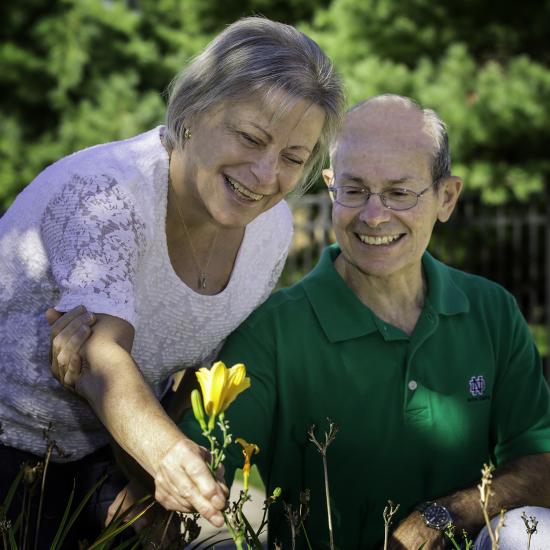How a Caregiver Found Support to Help With Her Husband's Dementia
Jane Zappa has been taking care of people almost all her life. The oldest of nine children, she grew up taking care of younger siblings. She is a registered nurse and raised three daughters. When Jane’s husband, retired military officer Pat Zappa, was diagnosed with a form of dementia in 2011, she had a lifetime of skills to draw upon.
She knew she needed to reach out for help. She and Pat ultimately found support through Wilder’s Caregiving Services. “I think Wilder does just a fantastic job of finding new and different ways to help the person with dementia and to help their families,” Jane says.
Pat and Jane joined the Living Well program for people experiencing early memory loss and their caregivers. Pat enjoyed exercise, creative arts and other engaging activities while Jane connected with other caregivers in a café-style atmosphere.
“He just loved it,” Jane says.
Reducing Stress with an Adult Day Program and a Caregiver Support Group
Because she knew to take advantage of services that reduce stress on the family, Jane eventually arranged for Pat to attend Wilder’s Adult Day Health program one day a week. Pat says he enjoys the activities, particularly the men’s group. He has maintained friendships with people he met at the Living Well program and has also made new acquaintances. While Pat attends the Adult Day Program, Jane has an opportunity for respite and catching up on things that need to be done.
Jane also knew she needed to seek support from others, so she joined a memory loss support group at Wilder. She appreciates the exchange of ideas among participants and the welcoming atmosphere at the Community Center for Aging. “The nice thing about the caregiver support group at Wilder is that it has been a great exchange of ideas between people,” Jane says. “I think people get the idea that we’re there to share and help each other.”
Creating a Caring Ecosystem
Pat’s dementia diagnosis came at a time when Wilder set out to transform the support available to informal caregivers in Minnesota and beyond. In 2011, the Richard M. Schulze Family Foundation announced a five-year, $2.2 million grant to expand caregiving services at Wilder, and the Foundation leveraged another $1.8 million from other sources.
Wilder experts in caregiving, community engagement and research worked together to expand services. They developed an award-winning public awareness campaign, collaborated on public policy changes, created new connections and partnerships, and developed innovative programs after listening to caregivers.
By intentionally and holistically expanding caregiving resources all at once, Wilder helped support a caregiving ecosystem, says Maureen Kenney, program manager of Caregiving Services. “We have engaged caregivers upstream, elevated conversations around caregiving, and built community capacity to respond to the needs of caregivers,” she says.
‘Reach Out and Get It’
Welcoming and relevant services for caregivers remain an important part of Wilder’s focus.
“I always think if what was happening to us now had happened 20 years ago, how little support there’d be,” Jane says. “Turning the clock ahead today, it’s just a wealth of support. Whatever you think you need, it seems to be available. You just have to reach out and get it.”
